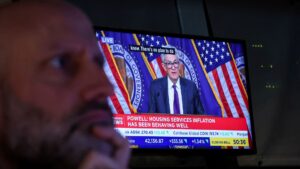Understanding the Fed’s Stance on Inflation: Is the Good Ship Transitory Ready to Sail Again?
Welcome to Extreme Investor Network, where we dive deep into the nuances of economic trends and empower you with insights to make informed investment decisions. Recently, the Federal Reserve has stirred conversations about inflation once again, as it navigates a complex economic landscape marked by tariffs and market volatility. Let’s unpack the latest developments and what they mean for investors like you.
The Fed’s New Inflation Projections
During a press conference that followed a recent Federal Open Market Committee meeting, Fed Chair Jerome Powell revealed that while inflation is projected to rise more rapidly than previously expected, the central bank believes this trend will be short-lived. This renewed focus on "transitory" inflation brings back memories of 2021 when inflation first surpassed the Fed’s 2% target due to COVID-induced supply and demand shocks.
Powell remarked, “So I think that’s kind of the base case,” referring to the notion that current inflationary pressures might be temporary. However, he acknowledged the uncertainty, stating, “We really can’t know that. We’re going to have to see how things actually work out.” This cautious optimism reflects the Fed’s commitment to closely monitor economic indicators and adjust policies as needed.
Tariffs and Their Implications
One of the main concerns influencing the Fed’s outlook is the potential impact of tariffs on prices. In efforts to protect domestic industries, past tariffs imposed during the Trump administration raised worries of igniting a more extensive global trade war, which could exacerbate inflation pressures within the U.S. economy.
Past experiences have demonstrated that the Fed’s initial assessment of inflation being transitory may have been overly optimistic. In 2021, inflation continued to rise, peaking at 9%—a level not seen in decades. The Fed responded with aggressive interest rate hikes, the likes of which hadn’t been witnessed since the early 1980s. This provoked significant market reactions, emphasizing how sensitive the economy is to fiscal policy changes.
Market Reactions and Future Projections
Surprisingly, as Powell addressed concerns regarding inflation during his latest announcement, stock markets reacted positively, with the Dow Jones Industrial Average rising by 383 points, showing investor confidence in the Fed’s ability to manage inflation. It seems investors are willing to embrace the "transitory" narrative, hoping that the increasing tariff-related costs won’t lead to sustained inflation.
Elyse Ausenbaugh, head of investment strategy at J.P. Morgan Wealth Management, highlighted this sentiment, noting that market reactions suggest a belief that tariffs and related policies won’t create long-term inflationary pressures. This optimism reflects a broader trust in the Fed’s judgment and its handling of monetary policy.
What This Means for Investors
As we navigate this economic uncertainty, it’s critical for you, the savvy investor, to stay informed and proactive. Here are some actionable insights from Extreme Investor Network to consider:
-
Diversify Your Portfolio: With potential interest rate cuts on the horizon, ensure your investment portfolio is diversified across various sectors to mitigate risks.
-
Follow Inflation Indicators: Keep an eye on key inflation indicators and economic reports—such as the consumer price index and producer price index—to gauge inflation’s trajectory and adjust your investment strategies accordingly.
-
Long-Term Outlook: While the current discourse focuses on short-term inflationary pressures, remember that market cycles can shift. Periodically reassess your investments based on long-term economic trends.
- Consider Defensive Investments: If inflation anxiety grows, defensive sectors like utilities or consumer staples might offer stability during volatile periods, providing a hedge against inflation.
In summary, while the Federal Reserve’s stance on inflation is cautiously optimistic, economic variables are continuously evolving. By staying informed and agile, you can position yourself for success, even in uncertain times. Join us at Extreme Investor Network as we continue to analyze these developments and equip you with the insights needed to navigate the complex world of investing.

